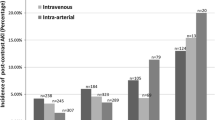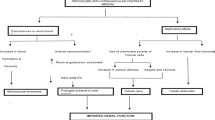Abstract
In the past, a high percentage of hospital-acquired renal failure was attributed to contrast media. That position is now very controversial. Recently, doubts have been raised regarding the real relationship between acute kidney injury and intravenous contrast media administration. Similarly, statements about specific methods of preventing contrast-inducing nephropathy have been challenged. This review article addresses the controversies of incidence, causation, and prevention in an attempt to help the practicing radiologist adopt methods for their own department.
Key Points
• The reported CIN incidence ranges from 2–12 % following contrast-enhanced CT.
• Studies without a non-contrast CT control group may overestimate CIN incidence.
• Development and application of a comprehensive CIN prevention strategy is recommended.

Similar content being viewed by others
References
Bartels ED, Brun GC, Gammeltoft A et al (1954) Acute anuria following intravenous pyelography in a patient with myelomatosis. Acta Med Scand 150:297–302
Haveman JW, Gansevoort RT, Bongaerts AH et al (2006) Low incidence of nephropathy in surgical ICU patients receiving intravenous contrast: a retrospective analysis. Intensive Care Med 32:1199–1205
Deek H, Newton P, Sheerin N et al (2014) Contrast media induced nephropathy: a literature review of the available evidence and recommendations for practice. Aust Crit Care 27:166–171
Chertow GM, Burdick E, Honour M et al (2005) Acute kidney injury, mortality, length of stay, and costs in hospitalized patients. J Am Soc Nephrol 16:3365–3370
Kooiman J, Pasha SM, Zondag W et al (2012) Meta-analysis: serum creatinine changes following contrast enhanced CT imaging. Eur J Radiol 81:2554–2561
Mitchell AM, Jones AE, Tumlin JA et al (2012) Incidence of contrast-induced nephropathy after contrast-enhanced computed tomography in the outpatient setting. Clin J Am Soc Nephrol 5:4–9
Lee J, Cho JY, Lee HJ et al (2014) Contrast-induced nephropathy in patients undergoing intravenous contrast-enhanced computed tomography in Korea: a multi-institutional study in 101487 patients. Korean J Radiol 15:456–463
Davenport MS, Khalatbari S, Cohan RH et al (2013) Contrast material-induced nephrotoxicity and intravenous low-osmolality iodinated contrast material: risk stratification by using estimated glomerular filtration rate. Radiology 268:719–728
Kooiman J, Sijpkens YW, van Buren M et al (2014) Randomised trial of no hydration vs. sodium bicarbonate hydration in patients with chronic kidney disease undergoing acute computed tomography-pulmonary angiography. J Thromb Haemost 12:1658–1666
Andreucci M, Solomon R, Tasanarong A (2014) Side effects of radiographic contrast media: pathogenesis, risk factors, and prevention. Biomed Res Int. 741018
Lima FO, Lev MH, Levy RA et al (2010) Functional contrast-enhanced CT for evaluation of acute ischemic stroke does not increase the risk of contrast-induced nephropathy. AJNR Am J Neuroradiol 31:817–821
McGillicuddy EA, Schuster KM, Kaplan LJ et al (2010) Contrast-induced nephropathy in elderly trauma patients. J Trauma 68:294–297
Kuhn MJ, Chen N, Sahani DV et al (2008) The PREDICT study: a randomized double-blind comparison of contrast-induced nephropathy after low- or isoosmolar contrast agent exposure. AJR Am J Roentgenol 191:151–157
Stacul F, van der Molen AJ, Reimer P et al (2011) Contrast induced nephropathy: updated ESUR Contrast Media Safety Committee guidelines. Eur Radiol 21:2527–2541
McDonald JS, McDonald RJ, Carter RE et al (2014) Risk of intravenous contrast material-mediated acute kidney injury: a propensity score-matched study stratified by baseline-estimated glomerular filtration rate. Radiology 271:65–73
McDonald RJ, McDonald JS, Carter RE et al (2014) Intravenous contrast material exposure is not an independent risk factor for dialysis or mortality. Radiology 273:714–725
Morcos SK, Thomsen HS, Webb JA (1999) Contrast-media-induced nephrotoxicity: a consensus report. Contrast Media Safety Committee, European Society of Urogenital Radiology (ESUR). Eur Radiol 8:1602–1613
Contrast media safety committee (2013) ESUR guidelines on contrast media version 8.1. 2013. http://www.esur.org/guidelines/
Mehta RL, Kellum JA, Shah SV et al (2007) Acute Kidney Injury Network. Acute Kidney Injury Network: report of an initiative to improve outcomes in acute kidney injury. Crit Care 2:R31
Ohno I, Hayashi H, Aonuma K et al (2013) Guidelines on the use of iodinated contrast media in patients with kidney disease 2012: digest version: JSN, JRS, and JCS Joint Working Group. Clin Exp Nephrol 17:441–479
Sendeski MM (2011) Pathophysiology of renal tissue damage by iodinated contrast media. Clin Exp Pharmacol Physiol 38:292–299
Nazıroğlu M, Yoldaş N, Uzgur EN et al (2013) Role of contrast media on oxidative stress, Ca(2+) signaling and apoptosis in kidney. J Membr Biol 246:91–100
Sadat U (2013) Radiographic contrast-media-induced acute kidney injury: pathophysiology and prophylactic strategies. ISRN Radiol 496438
Chang CF, Lin CC (2013) Current concepts of contrast-induced nephropathy: a brief review. J Chin Med Assoc 76:673–681
Zhang Y, Wang J, Yang X et al (2012) The serial effect of iodinated contrast media on renal hemodynamics and oxygenation as evaluated by ASL and BOLD MRI. Contrast Media Mol Imaging 7:418–425
Cronin RE (2010) Contrast-induced nephropathy: pathogenesis and prevention. Pediatr Nephrol 25:191–204
Solomon R (2008) Contrast-induced acute kidney injury: is there a risk after intravenous contrast? Clin J Am Soc Nephrol 3:1242–1243
Solomon R, Solomon R, Dauerman HL (2011) Contrast–induced acute kidney injury. Circulation 122:2451–2455
Meinel FG, De Cecco CN, Schoepf UJ et al (2014) Contrast–induced acute kidney injury: definition, epidemiology, and outcome. Biomed Res Int 859328
Murakami R, Hayashi H, Sugizaki K et al (2012) Contrast–induced nephropathy in patients with renal insufficiency undergoing contrast–enhanced MDCT. Eur Radiol 22:2147–2152
Bruce RJ, Djamali A, Shinki K et al (2009) Background fluctuation of kidney function versus contrast–induced nephrotoxicity. AJR Am J Roentgenol 92:711–718
McDonald JS, McDonald RJ, Comin J et al (2013) Frequency of acute kidney injury following intravenous contrast medium administration: a systematic review and meta-analysis. Radiology 267:119–128
Newhouse JH, Kho D, Rao QA et al (2008) Frequency of serum creatinine changes in the absence of iodinated contrast material: implications for studies of contrast nephrotoxicity. AJR Am J Roentgenol 191:376–382
Moos SI, van Vemde DN, Stoker J et al (2013) Contrast induced nephropathy in patients undergoing intravenous (IV) contrast enhanced computed tomography (CECT) and the relationship with risk factors: a meta-analysis. Eur J Radiol 82:e387–e399
Moos SI, Stoker J, Nagan G et al (2014) Prediction of presence of kidney disease in a general patient population undergoing intravenous iodinated contrast enhanced computed tomography. Eur Radiol 24:1266–1275
Herts BR, Schneider E, Poggio ED et al (2008) Identifying outpatients with renal insufficiency before contrast-enhanced CT by using estimated glomerular filtration rates versus serum creatinine levels. Radiology 248:106–113
Cicin I, Erdogan B, Gulsen E et al (2014) Incidence of contrast-induced nephropathy in hospitalised patients with cancer. Eur Radiol 24:184–190
Shin DH, Choi DJ, Youn TJ et al (2011) Comparison of contrast-induced nephrotoxicity of iodixanol and iopromide in patients with renal insufficiency undergoing coronary angiography. Am J Cardiol 108:189–194
Prasad V, Gandhi D, Stokum C et al (2014) Incidence of contrast material–induced nephropathy after neuroendovascular procedures. Radiology 273:853–858
Weisbord SD, Mor MK, Resnick A et al (2008) Incidence and outcomes of contrast-induced AKI following computed tomography. Clin J Am Soc Nephrol 3:1274–1281
Rudnick M, Feldman H (2008) Contrast-induced nephropathy: what are the true clinical consequences? Clin J Am Soc Nephrol 3:263–272
Seabra VF, Balk EM, Liangos O et al (2008) Timing of renal replacement therapy initiation in acute renal failure: a meta-analysis. Am J Kidney Dis 52:272–284
Iyem H, Tavli M, Akcicek F et al (2009) Importance of early dialysis for acute renal failure after an open-heart surgery. Hemodial Int 13:55–61
Schefold JC, von Haehling S, Pschowski R et al (2014) A The effect of continuous versus intermittent renal replacement therapy on the outcome of critically ill patients with acute renal failure (CONVINT): a prospective randomized controlled trial. Crit Care 18:R11
Liu YH, Liu Y, Tan N et al (2015) Contrast-induced nephropathy following chronic total occlusion percutaneous coronary intervention in patients with chronic kidney disease. Eur Radiol 25:2274–2281
Kooiman J, Sijpkens YW, de Vries JP et al (2014) A randomized comparison of 1-h sodium bicarbonate hydration versus standard peri-procedural saline hydration in patients with chronic kidney disease undergoing intravenous contrast-enhanced computerized tomography. Nephrol Dial Transplant 29:1029–1036
Weisbord SD, Palevsky PM (2008) Prevention of contrast-induced nephropathy with volume expansion. Clin J Am Soc Nephrol 3:273–280
Jang JS, Jin HY, Seo JS et al (2012) Sodium bicarbonate therapy for the prevention of contrast-induced acute kidney injury – a systematic review and meta-analysis. Circ J 76:2255–2265
Balemans CE, Reichert LJ, van Schelven BI et al (2012) Epidemiology of contrast material-induced nephropathy in the era of hydration. Radiology 263:706–713
Nijssen EC, Vermeeren MA, Janssen MM et al (2012) Contrast material-induced nephropathy in the era of hydration. Radiology 265:978–979
Kama A, Yılmaz S, Yaka E et al (2014) Comparison of short-term infusion regimens of N-acetylcysteine plus intravenous fluids, sodium bicarbonate plus intravenous fluids, and intravenous fluids alone for prevention of contrast-induced nephropathy in the emergency department. Acad Emerg Med 21:615–622
Hiremath S, Akbari A, Shabana W et al (2013) Prevention of contrast-induced acute kidney injury: is simple oral hydration similar to intravenous? A systematic review of the evidence. PLoS One 8:e60009
Traub SJ, Mitchell AM, Jones AE et al (2013) N-acetylcysteine plus intravenous fluids versus intravenous fluids alone to prevent contrast-induced nephropathy in emergency computed tomography. Ann Emerg Med 62:511–520
Sadat U, Usman A, Gillard JH et al (2013) Does ascorbic acid protect against contrast-induced acute kidney injury in patients undergoing coronary angiography: a systematic review with meta-analysis of randomized, controlled trials. J Am Coll Cardiol 62:2167–2175
Spatz C, Saadulla L, Lapsiwala A et al (2012) Effect of renin-angiotensin-aldosterone system blockade therapy on incidence of contrast-induced nephropathy in patients with chronic kidney disease. Iran J Kidney Dis 6:432–436
Marenzi G, Ferrari C, Marana I et al (2012) Prevention of contrast nephropathy by furosemide with matched hydration: the MYTHOS (Induced Diuresis With Matched Hydration Compared to Standard Hydration for Contrast Induced Nephropathy Prevention) trial. JACC Cardiovasc Interv 5:90–97
Wu MY, Hsiang HF, Wong CS et al (2013) The effectiveness of N-Acetylcysteine in preventing contrast-induced nephropathy in patients undergoing contrast-enhanced computed tomography: a meta-analysis of randomized controlled trials. Int Urol Nephrol 45:1309–1318
Hsu TF, Huang MK, Yu SH et al (2012) N-acetylcysteine for the prevention of contrast-induced nephropathy in the emergency department. Intern Med 51:2709–2714
Poletti PA, Platon A, De Seigneux S et al (2013) N-acetylcysteine does not prevent contrast nephropathy in patients with renal impairment undergoing emergency CT: a randomized study. BMC Nephrol 14:119
Richenberg J (2012) How to reduce nephropathy following contrast-enhanced CT: a lesson in policy implementation. Clin Radiol 67:1136–1145
Lu GM, Luo S, Meinel FG et al (2014) High-pitch computed tomography pulmonary angiography with iterative reconstruction at 80 kVp and 20 mL contrast agent volume. Eur Radiol 24:3260–3268
Luo S, Zhang LJ, Meinel FG et al (2014) Low tube voltage and low contrast material volume cerebral CT angiography. Eur Radiol 24:1677–1685
Zhang LJ, Qi L, Wang J, Tang CX et al (2014) Feasibility of prospectively ECG-triggered high-pitch coronary CT angiography with 30 mL iodinated contrast agent at 70 kVp: initial experience. Eur Radiol 24:1537–1546
Geyer LL, Schoepf UJ, Meinel FG et al (2015) State of the Art: Iterative CT reconstruction techniques. Radiology 276:339–357
Acknowledgments
The scientific guarantor of this publication is Long Jiang Zhang. The authors of this manuscript declare relationships with the following companies: UJS is a consultant for and receives research support from Bayer, Bracco, GE, Medrad, and Siemens. The other authors have no conflicts of interest to declare.
This study has received funding from the Program for New Century Excellent Talents in University (NCET-12-0260 to LJZ). No complex statistical methods were necessary for this paper. Institutional review board approval was not obtained because this is a review paper. Written informed consent was not obtained because this is a review paper. No study subjects or cohorts have been previously reported. Methodology: performed at one institution.
Author information
Authors and Affiliations
Corresponding author
Rights and permissions
About this article
Cite this article
Tao, S.M., Wichmann, J.L., Schoepf, U.J. et al. Contrast-induced nephropathy in CT: incidence, risk factors and strategies for prevention. Eur Radiol 26, 3310–3318 (2016). https://doi.org/10.1007/s00330-015-4155-8
Received:
Revised:
Accepted:
Published:
Issue Date:
DOI: https://doi.org/10.1007/s00330-015-4155-8




